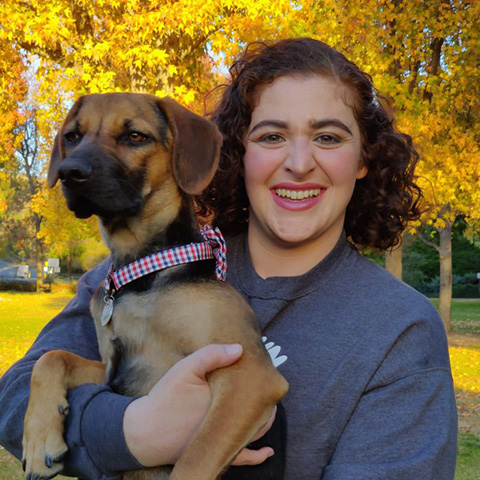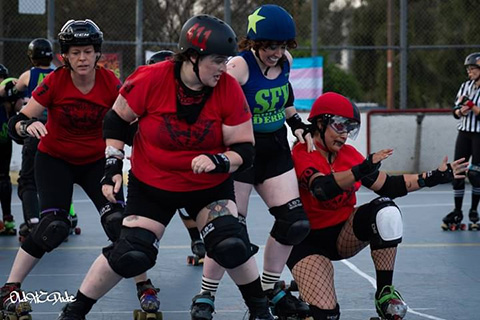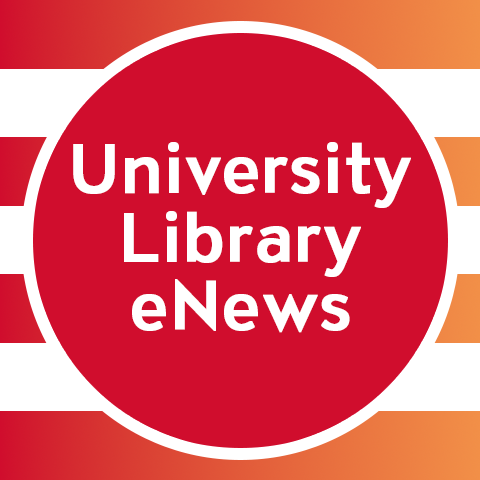Newsletter Edition: Spring 2025

What does the Outreach Librarian do?
Outreach is a very big umbrella. One part of the work is forming partnerships with local K-12 schools. I work with high school groups and younger students giving Library tours or partnering with teachers. Sometimes I work with AP classes that come in to use our database resources.
Then there's the “inside CSUN” outreach, which includes things like new student orientations and resource fairs. I collaborate with different campus partners and help plan student-centered programming, like the Finals week activities.
In addition to being the coordinator of Outreach Services, I am the liaison and subject specialists for Geography & Environmental Studies and Recreation & Tourism Management. So I have to balance Outreach activities with the other aspects of being an academic librarian.
Does Outreach work prepare high school students for college?
It can, for sure. My philosophy is to meet students where they're at with what's most meaningful for them. But thinking about college might not be relevant for a freshman or a sophomore. This morning I was working with the teacher librarian at one of our partner schools, the Northridge Academy High School. We used to do database research workshops with the 10th graders, but it became clear that the students weren't really doing that kind of research yet. So this year, we’ve turned it into a media and news literacy workshop, making them think about how to find sources online and how to fact-check them - exercises that promote critical thinking. This is necessary for college, but also for any age and any destination.
What are your goals for your on-campus activities?
In addition to promoting the variety of Library resources -- because there are more resources than students think -- it's really important that students see the University Library as an accessible place where they can feel comfortable. You can study in the library, but you can also have fun or just relax in the library.
When I was an undergraduate, I never met a librarian, and I ended up not succeeding at that school. That library at that institution was intimidating: it was a big building, it had a lot of floors, it had iconic architecture. It made me wonder, do I belong in that building?

For me, difficulty in school and my alienation from the library as a student are linked, so it’s really important to let students know, yes, you belong in here. The library is what you make of it, and we have resources to support you. I try to encourage people to connect with the library, but also connect with their interests. As an outreach librarian I’m kind of connecting the dots, right? Whether that's connecting someone from one side of campus to another, or to a resource, or to a piece of information, or to a new perspective.
And to that extent, outreach and information literacy go hand in hand. If I have the opportunity to talk to a student about how to do research, I’m in a better position to help them cope with information overload. Sometimes it's really just sitting with a student and holding space for their frustration and overwhelm. They have too many assignments, and too much information, and it's confusing. And I say, yeah, that’s valid.
When I was an undergraduate, no professor told me to “ask a librarian.” I’m really grateful that now we encourage students to ask a librarian, ask someone, find the person, ask the question.
What has been the most satisfying part about being an outreach librarian?
Definitely, working with students and getting to know the CSUN campus. It's really a unique community, and outreach has been a big part of how I've been able to experience that. Through that connection, the part of me that struggled in college gets to be healed. Being able to talk to undergraduates, seeing them going through it and giving them support. Our students are really good at gratitude - they're always so wonderful.
Another gratifying part of my position is the freedom I have to be creative. That attracted me to this job, being able to implement my ideas.
Are there challenges that go along with that?
Well, our limited budget, to start with. But more, navigating the rules of a big institution, and the time management that it demands. There is a flow to the semester and specific deadlines to meet. You have to plan ahead, so usually I feel like I'm working in multiple timelines. Part of me is working now – in March, but then I’m thinking about May and June and October.
What have you learned about how to do the job?
I'm still learning time management and how to navigate, but I do think I've gotten a little bit better. Now I'm learning how build more cohesive working groups. I'm learning how important it is to have a team of people to help you, especially when you're doing either multiple projects or really big projects that you can't do on your own. When I was a younger person, I’d say, I can just do it myself. But you can't do it all yourself, right? I think that's something people have to learn as they get older. I'm still learning when and how to delegate work, and asking a specific person for a specific type of help is a skill.
Do you see the mission or activities of the outreach librarian growing or changing as the CSUN community is impacted by budget shortfalls and the current endangerment of diversity, equity and inclusion (DEI) programming?
Regarding budget cuts, I do see the work changing, but I'm not worried. I have always been resourceful, and I think outreach is an area where we have a lot of room to be creative and stretch a dollar. I can turn around a program, strategically, on a compressed budget. It’s harder to do that with collections.
On the endangerment of DEI programming -- that's an interesting question. I've been thinking about this, because there's a feeling on campus that we need to eliminate this or that word from programs. But the programs that we create and maintain for Library outreach are for our students, and central to our campus. That includes programs that center marginalized people and uplift those experiences. DEI is endangered, but we can run these programs the way we've always done, because we were never running these programs for the purpose of DEI. We just tell our stories, right? We keep building community. We do it for our students, and we do it for ourselves.
It's necessary to have programs and information and broad collections that cover a variety of topics, so why would we stop? DEI was a trend, and now anti-DEI is a trend, so whatever the trend, we’re still going to do our work. Dig in and keep meeting our students’ needs. Library programming is so important to building community. Our campus is a community, but everyone still needs places to go and things to do and ways to meet each other. And I feel really positive that the University Library will continue to play a role in that.
